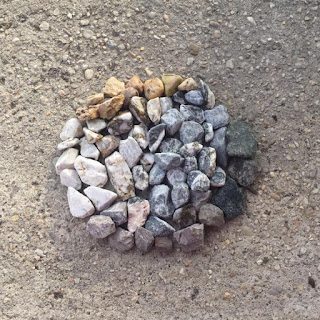May I?
Last week, it was delightful to see that the African boy (maybe 12 or 13) who normally attends the class one level down showed up at ours. Some of his classmates have been checking out our class in the last few months. If they are capable of catching up with the regulars in our class, they may move up. At the end, he decided not to participate because his ankle was hurting. Nevertheless, he stayed to watch.
Along the back of the studio are a few chairs for people to sit and change shoes. Students often leave their belongings on the chairs because nobody else is using the chairs during class. The boy paced back and forth to find a spot to sit and watch. He walked from chair to chair, but didn't dare to touch people's stuff. Eventually, he chose to sit on top of a radiator that is way too tall for anybody to sit on comfortably. I saw the whole thing from his reflection in the mirror. During a break, I went over to move my belongings and handed him my chair.
After class, he politely thanked me for "letting him use my chair". "No, it is not my chair. It is everybody's chair." "But you were using it . . ." The kid looked timid and uncomfortable. "No, actually I was NOT using it. I was done using it, but you needed it. I shouldn't have left my stuff on it. I'm sorry." I patted his shoulder and gave him a smile. He looked at me in awe. His father came over, let out a sigh and muttered a thank you.
Almost everybody at the studio would grab any empty chair to use without much hesitation. Sometimes there may be jackets, purses, tote bags hanging on the back of the chair, but most people don't care. Some would even remove the stuff from the chair and claim the chair for their own. This is the first time I see someone being so hesitant to take a chair not occupied. I wonder if it has to do with the fact that the majority fo the students are Caucasians and he is one of our few African young men?
Many years back, while walking down the street with a male African friend, Mike once came across an unlocked car with its headlights on. Without giving it a second thought, Mike opened the unlocked car door, reached in and turned off the lights for the owner. He turned around only to find that his black male friend had retreated several yards away from him and the car. Mike was flummoxed by the friend's dramatic move.
"You know, I can never do what you just did," said the friend. "Huh?" Mike remained confused. "What do you mean? What did I do?" The friend continued to step away as he explained, "As a black man, I cannot walk up to a car and open the door freely like you just did, whatever my intent is. I learnt not to do it. There are many things you can do that I can't. It is just the way it is. I can get into trouble if I do it, and I don't want to get into trouble."
I am not Caucasian, and I am not African. I don't know what it is like to be them. I can tell you, however, as Chinese American, many times, when I walk into fancy stores, I feel watched. Within a rather short time, I find more than enough salespeople coming to ask me what I am looking for, if I find what I am looking for, if I am finding everything alright, and if I need any help, please feel free to let them know.
Sure I will. They are all around me, anyways. I am sure I can find help rather easily.
Because of this kind of experiences, I have learnt to keep my hands to myself -- clutched together in front of me, or kept together behind me. I do not touch things that I do not intend to buy. At the register, when I present my credit card to pay, cashiers inspect my card front and back, and then look at me with curious eyes, "Your last name is Martin?" Who cares what credit scores I have or what my credit limit is? I am a suspicious person. I try not to let it bother me, but watching this African young man and his uncomfortable dance around the chairs, these memories just resurfaced.
On NPR, a researcher once talked about the different levels of sense of entitlement people of different colors exhibit. As you might have guessed, Caucasians are at the top of the list. Among her research subjects of similar social-economic classes, white children walk into a store and naturally feel it is ok to touch things, whereas black children have learnt to ask for permission first. Her conclusion is that black children are taught from a young age to think and, thus, act this way, contrary to their white counterparts.
If there is "White Privilege", may we call this "Black Burden"? This boy is at most 13 years old. He is going to carry this burden all his life. Talk about all men being created equal and this being a country of freedom and equality. We still have a very long way to go.
Along the back of the studio are a few chairs for people to sit and change shoes. Students often leave their belongings on the chairs because nobody else is using the chairs during class. The boy paced back and forth to find a spot to sit and watch. He walked from chair to chair, but didn't dare to touch people's stuff. Eventually, he chose to sit on top of a radiator that is way too tall for anybody to sit on comfortably. I saw the whole thing from his reflection in the mirror. During a break, I went over to move my belongings and handed him my chair.
After class, he politely thanked me for "letting him use my chair". "No, it is not my chair. It is everybody's chair." "But you were using it . . ." The kid looked timid and uncomfortable. "No, actually I was NOT using it. I was done using it, but you needed it. I shouldn't have left my stuff on it. I'm sorry." I patted his shoulder and gave him a smile. He looked at me in awe. His father came over, let out a sigh and muttered a thank you.
Almost everybody at the studio would grab any empty chair to use without much hesitation. Sometimes there may be jackets, purses, tote bags hanging on the back of the chair, but most people don't care. Some would even remove the stuff from the chair and claim the chair for their own. This is the first time I see someone being so hesitant to take a chair not occupied. I wonder if it has to do with the fact that the majority fo the students are Caucasians and he is one of our few African young men?
Many years back, while walking down the street with a male African friend, Mike once came across an unlocked car with its headlights on. Without giving it a second thought, Mike opened the unlocked car door, reached in and turned off the lights for the owner. He turned around only to find that his black male friend had retreated several yards away from him and the car. Mike was flummoxed by the friend's dramatic move.
"You know, I can never do what you just did," said the friend. "Huh?" Mike remained confused. "What do you mean? What did I do?" The friend continued to step away as he explained, "As a black man, I cannot walk up to a car and open the door freely like you just did, whatever my intent is. I learnt not to do it. There are many things you can do that I can't. It is just the way it is. I can get into trouble if I do it, and I don't want to get into trouble."
I am not Caucasian, and I am not African. I don't know what it is like to be them. I can tell you, however, as Chinese American, many times, when I walk into fancy stores, I feel watched. Within a rather short time, I find more than enough salespeople coming to ask me what I am looking for, if I find what I am looking for, if I am finding everything alright, and if I need any help, please feel free to let them know.
Sure I will. They are all around me, anyways. I am sure I can find help rather easily.
Because of this kind of experiences, I have learnt to keep my hands to myself -- clutched together in front of me, or kept together behind me. I do not touch things that I do not intend to buy. At the register, when I present my credit card to pay, cashiers inspect my card front and back, and then look at me with curious eyes, "Your last name is Martin?" Who cares what credit scores I have or what my credit limit is? I am a suspicious person. I try not to let it bother me, but watching this African young man and his uncomfortable dance around the chairs, these memories just resurfaced.
On NPR, a researcher once talked about the different levels of sense of entitlement people of different colors exhibit. As you might have guessed, Caucasians are at the top of the list. Among her research subjects of similar social-economic classes, white children walk into a store and naturally feel it is ok to touch things, whereas black children have learnt to ask for permission first. Her conclusion is that black children are taught from a young age to think and, thus, act this way, contrary to their white counterparts.
If there is "White Privilege", may we call this "Black Burden"? This boy is at most 13 years old. He is going to carry this burden all his life. Talk about all men being created equal and this being a country of freedom and equality. We still have a very long way to go.



This post reminds me of this: https://www.mcsweeneys.net/articles/product-review-the-invisible-backpack-of-white-privilege-from-ll-bean
ReplyDeleteAnother one of your insightful blogs. Thank you Meipo for your compassion and your friendship.
ReplyDelete